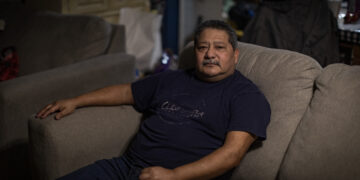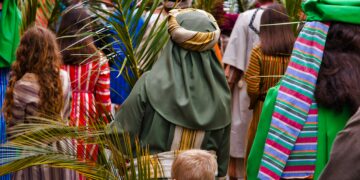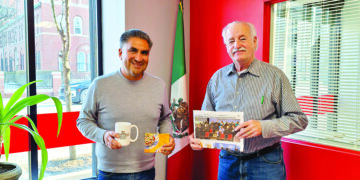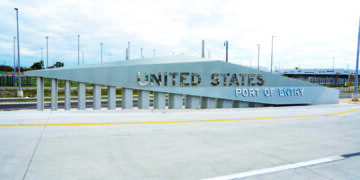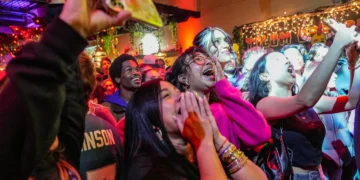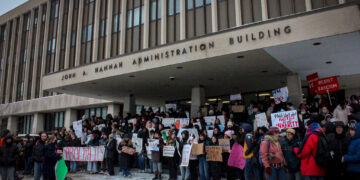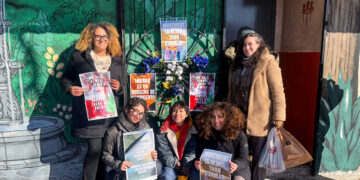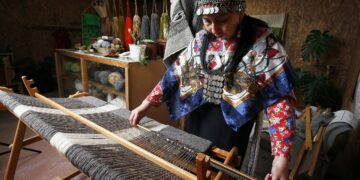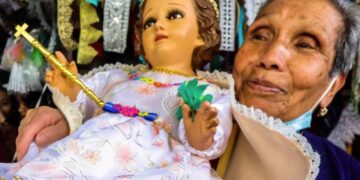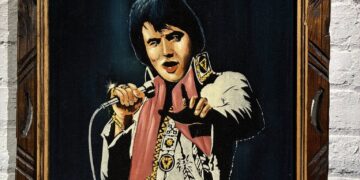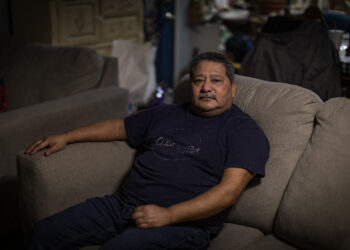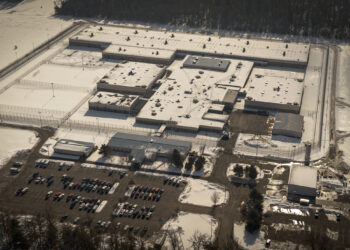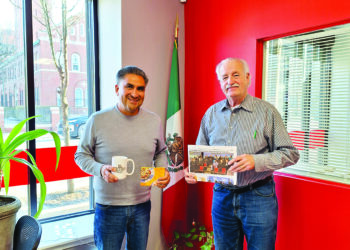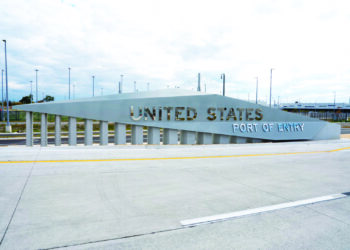One in every 67 people on earth has been forced to flee their home.
It is a sobering statistic from a 2024 report from the United Nations Refugee Agency, which documented that more than 123 million people worldwide have been forced to escape war, violence, persecution, human rights violations, environmental catastrophes and severe economic hardship.
For this reason, the universal Church recently celebrated the Jubilee of Migrants and the Jubilee of the Missions, during which Pope Leo XIV reminded all Catholics of their duty to welcome and assist migrants and imitate God’s love for them.
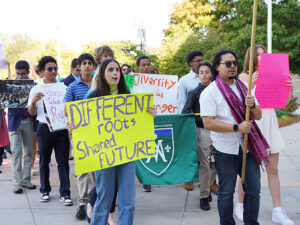
Locally, Detroit-based Strangers No Longer organized a Mass for the Jubilee of Migrants at the Cathedral of the Most Blessed Sacrament in Detroit on Oct. 5, when Archbishop Edward J. Weisenburger commended the group and its work in forming “Circles of Support” for migrants and refugees living in southeast Michigan.
“I’m deeply grateful for Strangers No Longer; yours is one of the extraordinary works both by the Church and for the Church,” Archbishop Weisenburger said. “Today’s celebration likewise is a reminder of the courage and the tenacity of those displaced by conflict, persecution, harsh economics, hunger, violence and more.”
The Mass was preceded by a procession around the cathedral, which featured banners calling for the humane treatment of migrants and refugees. As the procession entered, high school students read testimonies from migrants around the world, painting a picture of why millions of people every year brave oceans, deserts and jungles, leaving everything behind in hopes of finding a better life.
When migrants reach a new country that offers a chance of reprieve, they are often met by a population that is indifferent, or even hostile, to their presence, Archbishop Weisenburger said.
“An additional pain for these beloved ones who are forced to move on is the sad villanization attributed to many around the world,” Archbishop Weisenburger said. “In the face of that, I’m so proud and grateful to be Catholic.”
The archbishop recalled his previous experiences as bishop of the Diocese of Tucson, Arizona, working alongside immigrants at the Mexico-U.S. border, where at their peak they served 1,400 immigrants a day.
“Yet around the world, these cousins of ours are maligned and oftentimes harassed, if not persecuted,” Archbishop Weisenburger said. “So I think it’s fair to say that this Sunday’s universal celebration throughout the entire Catholic world is intended to help us focus our vision where it must be, and then answer that question: ‘What is a Christian? What does a disciple of Jesus do?'”
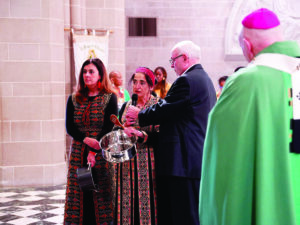
Borrowing from Pope Leo’s homily earlier in the day, Archbishop Weisenburger noted how migrants can be modern-day missionaries, carrying the message of Jesus Christ from one place to another, and invigorating their new communities.
“The Holy Father knows that in a very unique way, Catholic migrants and refugees can be missionaries of great hope in the countries that welcome them, forging new paths of faith where the message of Jesus has not arrived,” Archbishop Weisenburger said. “With their spiritual enthusiasm and vitality, they can even help revitalize parishes that have become rigid and weighed down.”
The Mass itself featured the rich tapestry of cultures in the Archdiocese of Detroit, with music provided by the Ugandan Catholic Community of Michigan Choir, the Ste. Anne de Detroit Choir, the St. Gabriel Marimba Ensemble and the Sacred Heart Choir. Prayers of the faithful were read in Spanish, Italian, French, Gaelic and Luganda.
During the offertory, migrants and parishioners with immigrant backgrounds presented Archbishop Weisenburger with symbols from around the world, which told stories about the struggles migrants have faced. One, a Palestinian refugee, presented an empty pot, symbolizing the continuing famine in Gaza due to the ongoing war with Israel.
After Communion, Archbishop Weisenburger blessed leaders from Strangers No Longer who will be traveling to the Arizona-Mexico border for a bi-national gathering of immigrant rights supporters.
Amy Ketner, director of leadership development for Strangers No Longer, said the group is calling those who will be traveling “missionaries of hope.”
“Right now, they are working with immigrants in their communities to gather stories that they can share with others, so we know better how to serve our friends and neighbors and get people to see the immigrants and migrants as integral parts of their communities,” Ketner said.
As part of the 2025 Jubilee Year of Hope, Archbishop Weisenburger imparted an apostolic blessing upon the assembly, which offers the possibility of a plenary indulgence, provided those receiving it receive the Eucharist and confession within a reasonable amount of time.
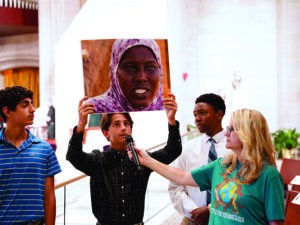
Della Lawrence, director of campus ministry at Notre Dame Preparatory in Pontiac, said students at the school are working with Circles of Support to spread awareness about what can be done to help migrants in their community.
Immigration is a contentious political topic, Lawrence acknowledged, but said groups like Strangers No Longer are trying to make the discussion about people, not policies.
“You have to start from a personal perspective,” Lawrence said. “Everybody has a tradition, background, and culture they are coming from. So we start there and share with one another each other’s traditions, food or celebrations. Often, people don’t have a home anymore, because they had to flee. When we share these stories and get into the details, the conversations become more productive, and people begin to understand.”
Concluding his homily, Archbishop Weisenburger reflected upon the Gospel reading from St. Luke, in which Jesus tells a parable of the servant commanded to fix supper for his master after working in the fields. Like the tireless servant in the Gospel, Christian disciples are called to do the work of the Master without expecting a reward — but often finding one anyway.
“I believe today’s celebration involves first opening our eyes — understanding the real situation and seeing it through the vision of Christ,” Archbishop Weisenburger said. “In doing so, we need to commit ourselves to working slavishly with no expectation of reward for the Christ we find in migrants and immigrants, while knowing in the end, in the midst of their suffering, it is they who are serving us.
“Having served him, let us learn from them how to be a people of hope, a people on the move, a people journeying together on the way.”
Fe y esperanza para los migrantes, pide Weisenburger
Uno de cada 67 habitantes del planeta ha tenido que huir de su hogar.
Es una cifra alarmante del informe 2024 de la Agencia de la ONU para los Refugiados, que documentó que más de 123 millones de personas en todo el mundo se han visto obligadas a escapar de la guerra, la violencia, la persecución, violaciones a los derechos humanos, desastres naturales y crisis económicas graves.
Por eso, la Iglesia universal celebró recientemente el Jubileo de los Migrantes y el Jubileo de las Misiones, en los que el papa León XIV recordó a todos los católicos su deber de acoger y apoyar a los migrantes, e imitar el amor de Dios hacia ellos.
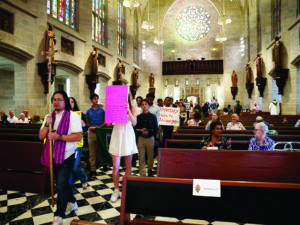
En Detroit, la organización Strangers No Longer (Ya No Somos Extraños) organizó una misa especial en la Catedral del Santísimo Sacramento el pasado 5 de octubre. Durante la ceremonia, el arzobispo Edward J. Weisenburger reconoció el trabajo del grupo y sus Círculos de Apoyo, que acompañan a migrantes y refugiados en el sureste de Michigan.
“Estoy profundamente agradecido con Strangers No Longer; su labor es una obra extraordinaria de la Iglesia y para la Iglesia”, dijo el arzobispo Weisenburger. “La celebración de hoy nos recuerda el valor y la tenacidad de quienes han sido desplazados por conflictos, persecuciones, hambre, violencia y más.”
Antes de la misa hubo una procesión alrededor de la catedral con mantas y carteles que pedían un trato más humano para migrantes y refugiados. Mientras el grupo entraba, estudiantes de preparatoria leyeron testimonios de personas migrantes de todo el mundo, mostrando las razones por las que millones cruzan océanos, desiertos y selvas cada año con la esperanza de una vida mejor.
Pero al llegar a nuevos países, explicó el arzobispo, muchos migrantes se enfrentan a poblaciones que los miran con indiferencia o hasta con rechazo.
“Un dolor adicional para nuestros hermanos y hermanas que se ven forzados a moverse es la triste criminalización que muchos sufren alrededor del mundo”, dijo Weisenburger. “Ante eso, me siento orgulloso y agradecido de ser católico.”
El arzobispo recordó su experiencia como obispo en Tucson, Arizona, donde trabajó junto a migrantes en la frontera entre México y Estados Unidos, llegando a atender hasta mil cuatrocientas personas al día.
“Aun así, en muchas partes del mundo, nuestros hermanos son malinterpretados o acosados, si no perseguidos,” comentó. “Por eso este domingo, en todo el mundo católico, celebramos algo que nos invita a enfocar la mirada y responder a la pregunta: ¿qué hace un verdadero cristiano, un discípulo de Jesús?”
Inspirado por las palabras del papa León XIV, Weisenburger destacó que los migrantes también pueden ser misioneros modernos, que llevan el mensaje de Cristo a nuevos lugares y revitalizan las comunidades que los reciben.
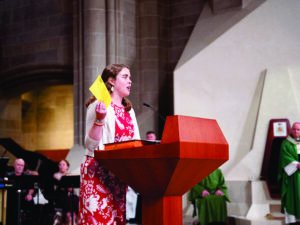
“El Santo Padre reconoce que, de una forma muy especial, los migrantes y refugiados católicos pueden ser misioneros de esperanza en los países que los acogen”, dijo. “Con su entusiasmo y vitalidad espiritual, pueden incluso revivir parroquias que se han vuelto rígidas o apagadas.”
La misa mostró la diversidad cultural de la Arquidiócesis de Detroit: hubo música del coro ugandés Catholic Community of Michigan, del coro Ste. Anne de Detroit, del Ensamble de Marimba de San Gabriel y del Coro del Sagrado Corazón. Las oraciones se leyeron en español, italiano, francés, gaélico y luganda.
Durante el ofertorio, migrantes y feligreses de familias inmigrantes ofrecieron símbolos de distintas partes del mundo, representando las luchas que enfrentan los pueblos desplazados. Una refugiada palestina presentó una olla vacía, símbolo del hambre que persiste en Gaza debido a la guerra con Israel.
Después de la comunión, el arzobispo Weisenburger bendijo a líderes de Strangers No Longer que viajarán a la frontera de Arizona y México para un encuentro binacional de apoyo a los derechos de los migrantes.
La directora de desarrollo de liderazgo del grupo, Amy Ketner, explicó que a quienes viajan los llaman “misioneros de esperanza.”
“Ellos están trabajando con migrantes en sus comunidades para recopilar historias y compartirlas con otros, de modo que aprendamos cómo servir mejor a nuestros amigos y vecinos, y que la gente los vea como parte esencial de la comunidad,” dijo Ketner.
Como parte del Año Jubilar de la Esperanza 2025, el arzobispo otorgó una bendición apostólica a todos los presentes, con la posibilidad de obtener indulgencia plenaria si reciben la Eucaristía y la confesión en un tiempo razonable.
Della Lawrence, directora del ministerio estudiantil en Notre Dame Preparatory de Pontiac, dijo que sus alumnos están colaborando con los Círculos de Apoyo para crear conciencia sobre cómo ayudar a los migrantes en su entorno.
Lawrence reconoció que la migración es un tema político delicado, pero destacó que organizaciones como Strangers No Longer buscan poner el enfoque en las personas, no en las políticas.
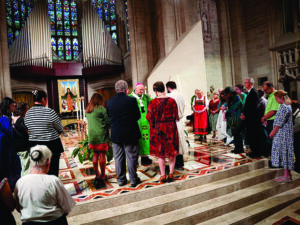
su partida hacia una reunión binacional de defensores de los derechos de los migrantes en la frontera entre Arizona y México
“Hay que empezar desde lo humano,” explicó. “Cada persona tiene su historia, su cultura, su raíz. Así que comenzamos compartiendo nuestras tradiciones, nuestra comida, nuestras celebraciones. Muchos ya no tienen hogar porque tuvieron que huir. Cuando compartimos esas historias, las conversaciones se vuelven más reales y la gente empieza a entender.”
Cerrando su homilía, el arzobispo Weisenburger reflexionó sobre el Evangelio de San Lucas, donde Jesús habla del siervo que, tras trabajar en el campo, todavía prepara la cena para su amo. Así también, dijo, los discípulos de Cristo están llamados a servir sin esperar recompensa, aunque a menudo la encuentran en el camino.
“Creo que la celebración de hoy empieza por abrir los ojos—entender la situación real y verla con la mirada de Cristo,” dijo. “Al hacerlo, debemos comprometernos a trabajar sin esperar nada a cambio por el Cristo que encontramos en los migrantes e inmigrantes, sabiendo que, en medio de su sufrimiento, son ellos quienes también nos sirven.”
Con voz serena, concluyó, “Habiendo servido al Señor, aprendamos de ellos a ser un pueblo de esperanza, un pueblo en movimiento, un pueblo que camina unido en el camino.”

